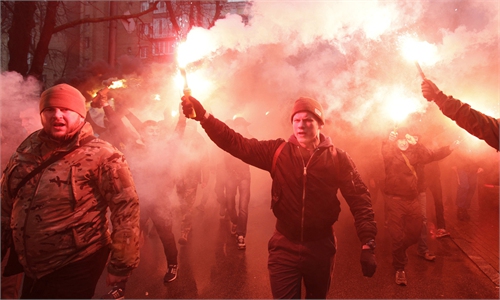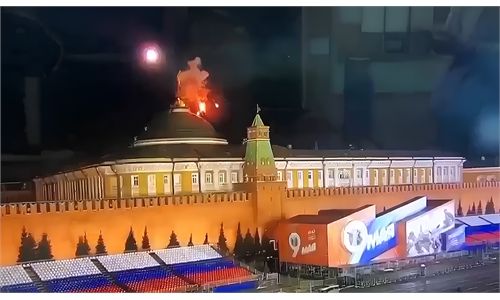IN-DEPTH / IN-DEPTH
US officials attending rally led by neo-Nazi supporters 'yet another example of US supporting extremists for strategic goals'
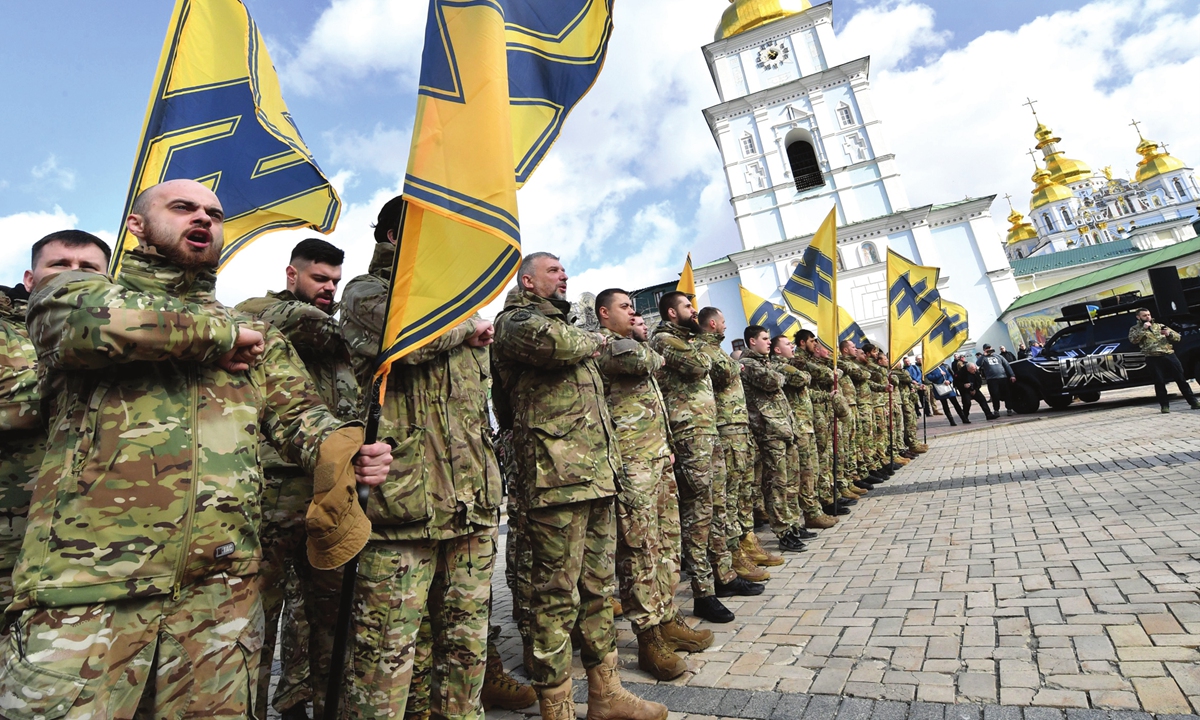
Azov far-right activists shout slogans during a march in Kiev on March 14, 2020. Photo: VCG
The alleged drone attack on the Kremlin last week added more fuel to the tense Russia-Ukraine situation. The drone incident was likely the work of extremists advocating for war in Ukraine, some experts told the Global Times.
Ukraine denied that it had tried to attack the Kremlin with drones. Russia also accused the US of being behind the drone incident. "We know very well that decisions about such actions, about such terrorist attacks, are made not in Kiev but also in Washington," said Putin's spokesperson Dmitry Peskov, according to a Reuters report on Thursday.
For more than a year, the Russia-Ukraine conflict has not turned any better under the intervention of the US-led West. Evidence has shown that the US has frequently meddled in the conflicts, and even openly and covertly backed neo-Nazi groups in Ukraine.
A February rally in the US suggested that several Biden officials are close to the Ukrainian far-right forces and their supporters. The possible collusion, as revealed by a recent article on the US-based independent news outlet The Grayzone, seems to be another example of how the US government and some officials have been colluding with Ukrainian extremist forces in the last decade.
Monday marked Victory in Europe Day for the US and many Western European countries where people celebrated the victory against fascism in WWII. Ironically, as the international community was alerted to the resurgence of neo-Nazi forces, the US was one of just two countries to veto a United Nations (UN) draft resolution "combating the glorification of Nazism, neo-Nazism and other practices that contribute to fueling contemporary forms of racism." The other was Ukraine.
The US' probable collaboration with far-right forces in Ukraine exposes that the country can trample on any ethical rules for its own strategic goals and interests, noted Zhang Yifei, associate research fellow at the Institute of American Studies, Chinese Academy of Social Sciences.
For the US, the far-right forces in Ukraine, with a long-term anti-Russia internal drive, are a good tool to confront Russia, Zhang said.
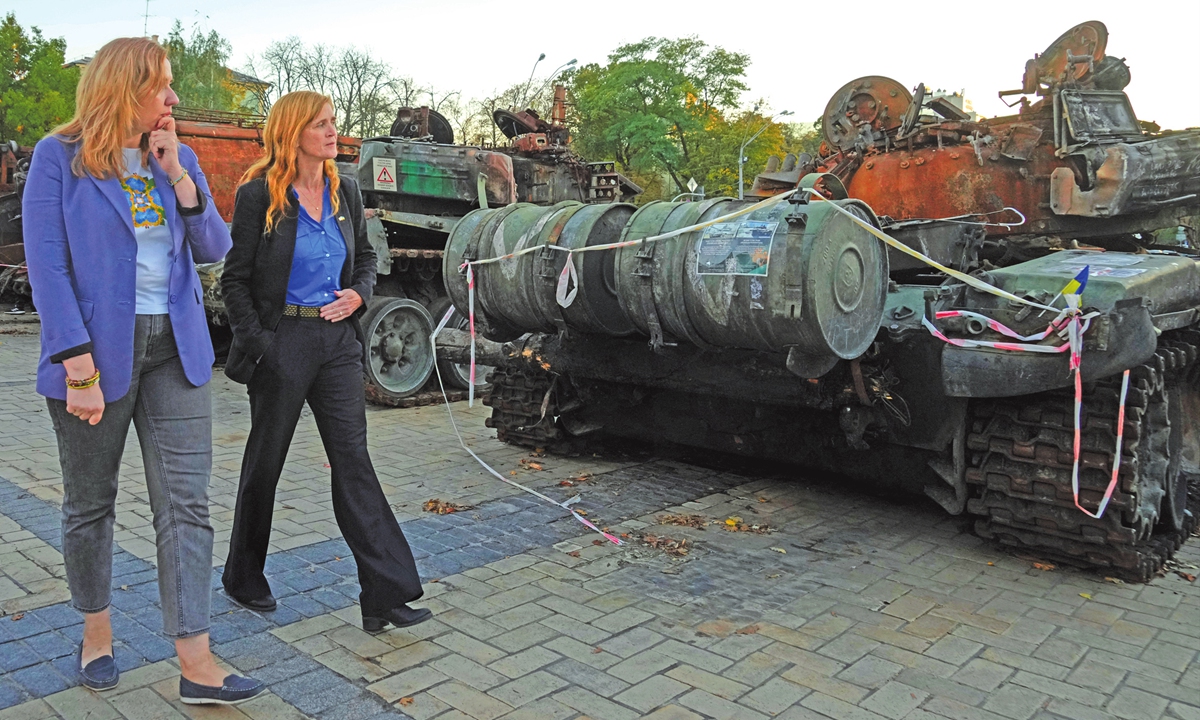
USAID Administrator Samantha Power looks at destroyed Russian military vehicles in Kiev, Ukraine on October 6, 2022. Photo: IC
Close to neo-Nazi supporters
Several US Officials reportedly participated in a rally in support of Ukraine at the Lincoln Memorial on February 25. According to some US media sources and government websites, the rally was to call for people to "stand in solidarity with the Ukrainian people who bravely continue to defend their homeland," said a press release by the United States Agency for International Development (USAID), whose administrator Samantha Power was on the attendance list.
However, the rally was actually a pro-war demonstration organized by a group of Ukrainian supporters of far-right forces that are "dedicated to honoring and fundraising for ultra-nationalists and war criminals," said an investigative report published on The Grayzone in March.
Co-organizers of the rally included several US-based NGOs like US Ukrainian Activists and the Ukrainian Congress Committee of America, according to the website of the Ukrainian Worldwide Information Network.
The two groups above have openly supported far-right elements in Ukraine since the US-backed Maidan coup in 2014, noted the author of the Grayzone article Alexander Rubinstein, who identified himself as an independent reporter.
The US Ukrainian Activists' founder Nadiya Shaporynska, for instance, has posted information on Facebook showing her support and documenting her fundraising activities for ultra-nationalist groups like the Right Sector.
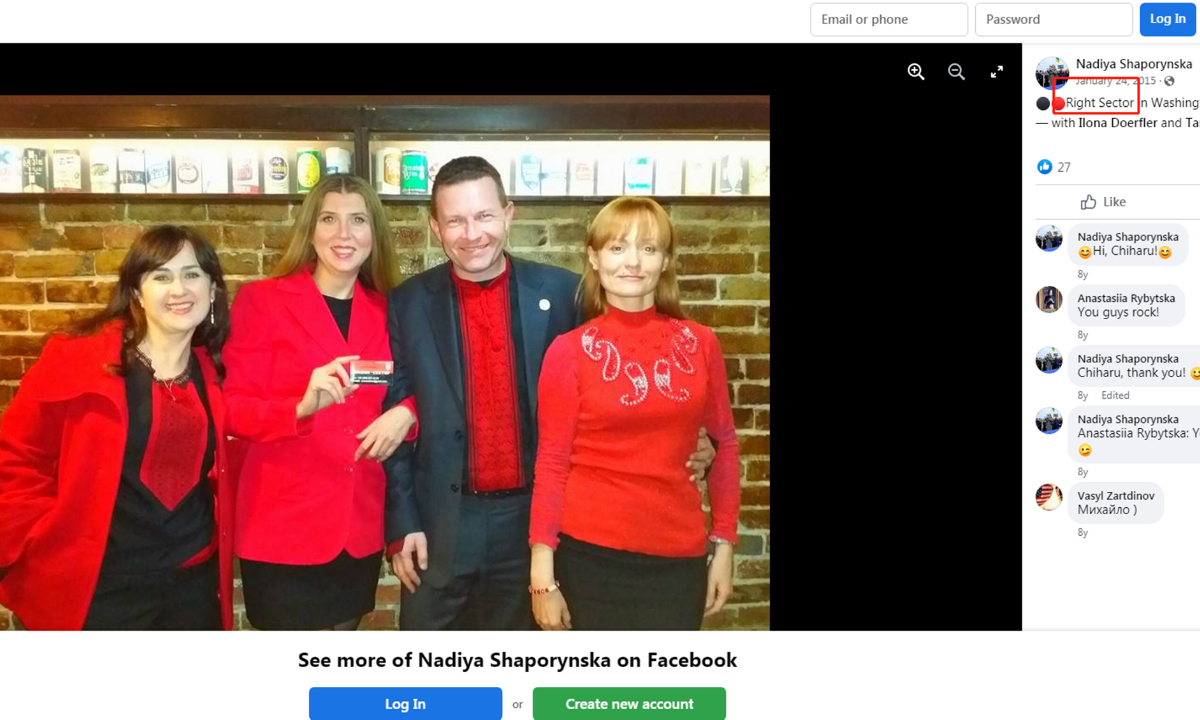
The US Ukrainian Activists' founder Nadiya Shaporynska posts on Facebook showing her support for ultra-nationalist groups like the Right Sector. (Photo: screenshot of Facebook)
Right Sector is a Ukrainian nationalist political organization known for its far-right views and has been accused of promoting anti-Semitism and xenophobia.
The Ukrainian Congress Committee of America is one of the member organizations of the "Ukrainian World Congress," a group that declared Stepan Bandera on its website as "the undisputed symbol of Ukraine's lengthy and tragic struggle for independence."
Bandera was a leader of the militant branch of the Organization of Ukrainian Nationalists (OUN) who collaborated with Nazi Germany and helped to launch programs targeting Jews during WWII, according to Norman J.W. Goda, a US-based expert in Holocaust Studies.
The "pro-war" rally led by neo-Nazi supporters nonetheless gathered many prominent US officials. Apart from USAID's Power, the Assistant Secretary of State for European and Eurasian Affairs Karen Donfried, and Secretary of State of the District of Columbia Kimberly Bassett, were also on the rally's list of speakers.
"It should come as no surprise that we see members of the US government collaborating with fascists," Rubinstein told Sputnik in March. As early as when the Maidan coup took place, several US officials had shown public support for Ukrainian pro-Nazi forces, which caused wide concern on the possible connection between the US government and the extremist groups.
In 2014, former US Secretary of State John Kerry visited Ukraine after the unrest and met far-right activist Oleh Tyahnybok, leader of Ukrainian ultranationalist political party Svoboda. Tyahnybok was infamous for his anti-Semitic, neo-fascist stance in the early years.
Former Senator John McCain also reportedly had close ties with Ukrainian far-right leaders including Oleh Tyahnybok. A Business Insider article in 2013 described McCain's meeting with Tyahnybok in Ukraine that year as "standing on stage with a man accused of being an anti-Semitic neo-Nazi."
Obviously, US officials got close to Ukrainian far-right forces and their supporters to serve the US' own geopolitical interests, including its military-industrial complex gaining huge profits from Ukraine's unrest, said observers.
"Also, as long as the conflicts continue with hardened anti-Russian forces, the Europe will get more dependent on the US for security and energy," Zhang told the Global Times.
US politicians' support for neo-Nazis is driven by a strategic orientation that always prioritizes American interests. The US approaches any political group that can be utilized as a means to achieve its hegemonic and manipulative needs in the internal affairs of other countries, and the US will spare no expense to achieve this goal, Su Hao, director of the Asia-Pacific Research Center at the China Foreign Affairs University, told the Global Times.
"In the US' political dictionary, there is no such thing as morality or mainstream consensus in the international community. This also exposes the double standards of the US - on the one hand, it upholds so-called democratic values, while on the other hand, it continues to support some separatist and terrorist forces, as well as sheltering right-wing extremists. This has made the hypocrisy of US politics clear to the world," Su said.
US behind the curtain
In addition to American politicians, some US government agencies are yet to sever their ties with Ukrainian far-right groups. For example, since Azov Battalion was founded in 2014, many American media outlets have revealed its potential connections with US authorities.
In 2015, the US Congress removed a ban on funding neo-Nazi groups like Azov Battalion from its year-end spending bill, according to an article by The Nation magazine in January 2016.
Azov Battalion is known in the West for its extreme neo-Nazi stance, and for its suspected involvement in a number of terrorist attacks and separatist incitement incidents in various countries and regions.
Media sources also found out that American weapons given to Ukraine are "flowing directly to the extremists of Azov." What's more, it is reported that the US' Central Intelligence Agency (CIA) has been secretly training forces for Ukraine since 2015, a Yahoo News article from January 2022 quoted "five former intelligence and national security officials familiar with the initiative" as saying.
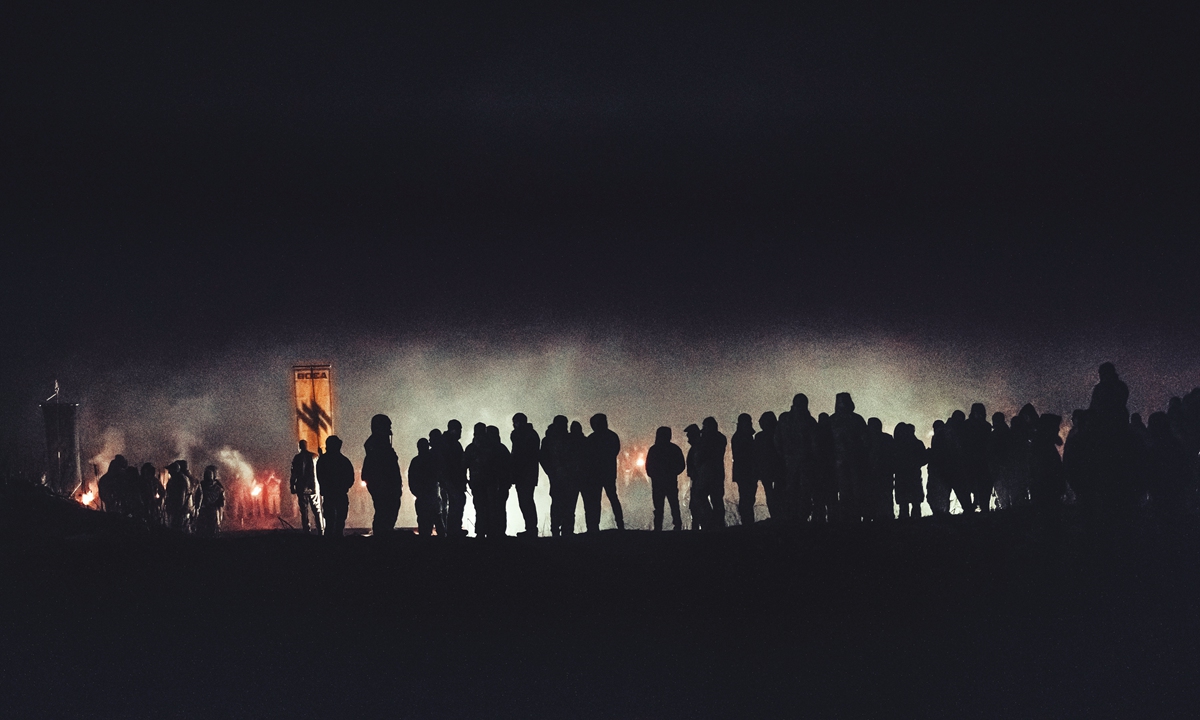
Thousands of Azov soldiers attend a traditional ceremony as they gather in front of a burning replica of a Drakkar viking ship in the Rivne region, Ukraine on December 22, 2022. Photo: VCG
"From historical experience, the consequence of the US government's actions is often that the extreme terrorist organizations it supports will turn against it, while also causing more and more countries in the world to resent it. This will further prolong and radicalize the conflict between Russia and Ukraine, bringing greater disaster to both peoples," Su told the Global Times.
The US' continuous support of far-right groups in Ukraine, which brings great benefits to certain interest groups, has largely been a source of tension within US society, Zhang pointed out.
"US authorities feed Ukrainian far-right forces with US taxpayers' money to expand conflicts and even wars," Zhang said. "However, only a few groups like the military industrial enterprises can profit from the conflicts and wars. Ordinary people in the US gain nothing."
Zhang added that globally, the support of neo-Nazi forces in Ukraine may cause great security risks to the US and Europe, even the whole world.
"Nazism is like a festering tumor in the history of human thought," he told the Global Times. "Once far-right thought spreads among the armed, it is extremely hard for the US to control them as it expects."
The US doesn't seem to have learned any lessons from its previous assistance to Afghan mujahideen groups, including those that Osama bin Laden was associated with, during the Soviet-Afghan War in the 1980s, said Zhang.
